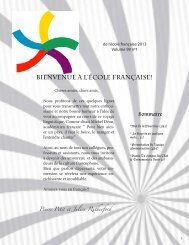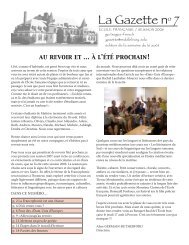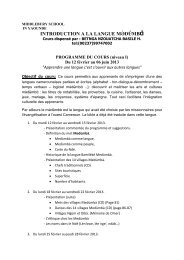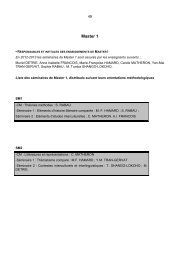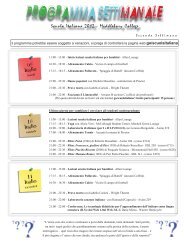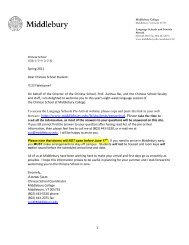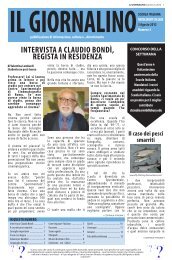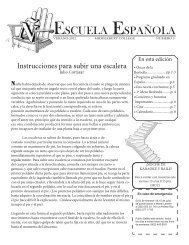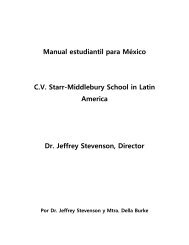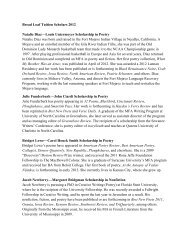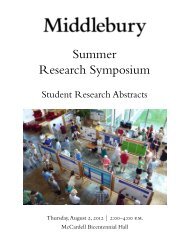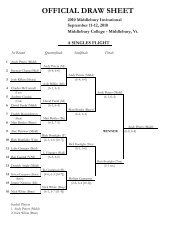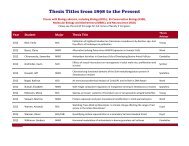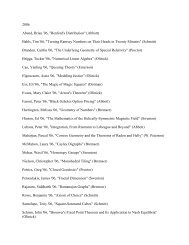2010 Catalog - Middlebury College
2010 Catalog - Middlebury College
2010 Catalog - Middlebury College
You also want an ePaper? Increase the reach of your titles
YUMPU automatically turns print PDFs into web optimized ePapers that Google loves.
7660 Autobiography in America/Mr. Stepto/M–F 11:15–12:15<br />
This discussion-oriented course offers two approaches to the study<br />
of American autobiography: the study of classic American autobiographical<br />
forms and the study of prevailing autobiographical strategies.<br />
The classic forms to be discussed include the Indian captivity narrative<br />
(Rowlandson and Marrant), the nation-building narrative (Franklin),<br />
slave narratives (Douglass and Jacobs), immigrant narratives (Antin and<br />
Kingston), and the cause narrative (Balakian). The strategies to be studied<br />
include photographic strategies (Uchida), writing another (Karr and<br />
Als), the self in translation (Silko), autobiography and work (Ehrenreich,<br />
Ginsberg, and Saunders), and autobiography and place (Blunt). Students<br />
will be expected to complete two writing assignments, the second of<br />
which can be a personal essay employing one of the strategies discussed<br />
in the course. Students will also contribute regularly to the class journal<br />
kept in the library and participate in one or more presentation groups.<br />
Texts: Photocopied materials will be available for Mary Rowlandson<br />
and John Marrant (if you wish to read in advance, both narratives are<br />
in R. VanDerBeets, ed., Held Captive By Indians [1973] and other volumes).<br />
All of the following titles are in paperback: The Autobiography<br />
of Benjamin Franklin (Dover Thrift); The Classic Slave Narratives,<br />
ed. Henry Louis Gates (Signet); Mary Antin, The Promised Land<br />
(Penguin); Maxine Hong Kingston, The Woman Warrior (Vintage);<br />
Peter Balakian, Black Dog of Fate (Broadway); Yoshiko Uchida, Desert<br />
Exile (Washington); Mary Karr, The Liar’s Club (Penguin); Hilton<br />
Als, The Women (Noonday); Leslie Marmon Silko, Storyteller (Arcade);<br />
Barbara Ehrenreich, Nickel and Dimed (Holt); Debra Ginsberg, Waiting<br />
(HarperCollins); George Saunders, “Christmas, Chicago 1984”<br />
(photocopy provided at Bread Loaf; or see The New Yorker archives);<br />
Judy Blunt, Breaking Clean (Vintage).<br />
7670 American Indian Literature/Ms. Maddox/M–F 10–11<br />
We will read fiction and poetry by modern and contemporary<br />
American Indian writers from various parts of North America and with<br />
various tribal affiliations. In our consideration of these texts, we will<br />
pay particular attention to their approaches to the concepts of place and<br />
home. This focus will allow us to consider a number of issues that are<br />
fundamental to this body of literature, including the relevance of tribal<br />
histories and tribal diasporas; the possibilities for defining a Native<br />
aesthetic; and the importance of political and cultural sovereignty.<br />
A few critical essays will be provided at Bread Loaf.<br />
Texts: James Welch, Winter in the Blood (Penguin); Leslie Marmon<br />
Silko, Ceremony (Penguin); Louise Erdrich, Love Medicine (McGraw-<br />
Hill); Simon Ortiz, Out There Somewhere (Arizona); N. Scott Momaday,<br />
The Way to Rainy Mountain (New Mexico); Heid E. Erdrich, National<br />
Monuments (Michigan); Sherman Alexie, Flight (Grove); Thomas King,<br />
Green Grass, Running Water (Bantam).<br />
Group V (World Literature)<br />
7215 The King James Bible/Mr. Shoulson/M–F 10–11<br />
See description under Group II offerings. This course can be used to satisfy either<br />
a Group II or a Group V requirement; students should indicate their choice at<br />
the time of registration.<br />
7298 Renaissance Stage Comedy/Mr. Cadden and Ms. Wofford<br />
M, W 2–4:45<br />
See description under Group II offerings. This course can be used to satisfy either<br />
a Group II or a Group V requirement; students should indicate their choice at<br />
the time of registration.<br />
7455 Fiction of Empire and the Breakup of Empire<br />
Ms. Sabin/M, W 2–4:45<br />
See description under Group III offerings. This course can be used to satisfy<br />
either a Group III or a Group V requirement; students should indicate their<br />
choice at the time of registration.<br />
31<br />
7755 Thinking Theory/Mr. Wood/M–F 11:15–12:15<br />
“Theory” in literature has come to be the collective name for a whole<br />
range of thoughts and practices, often but not always connecting the<br />
study of literature with movements in European philosophy. The aim<br />
of the course is to read closely a number of major works in this rather<br />
loose tradition. The selection of texts seeks to represent something of<br />
the richness of the possibilities but the general idea is not so much to<br />
survey the field as to gain real knowledge of particular instances and<br />
make up our own minds about the challenges they represent.<br />
Texts: Sigmund Freud, On Dreams (Cosimo Classics); Walter Benjamin,<br />
Reflections (Schocken); Virginia Woolf, A Room of One’s Own and<br />
Three Guineas (Oxford); T.W. Adorno, Minima Moralia (Verso); Jacques<br />
Derrida, Monolingualism of the Other (Stanford); Giorgio Agamben, Homo<br />
Sacer (Stanford); Judith Butler, Giving an Account of Oneself (Fordham).<br />
7767 Modern European Fiction/Mr. Wood/M–F 8:45–9:45<br />
Beginning with Dostoevsky’s complicated revision of the scope and<br />
ambitions of the novel as a genre, this course will trace major developments<br />
in modern European fiction from the 1880s to the 1970s. We<br />
shall look in close detail at six novels (written in Russian, German,<br />
English, French, and Italian), paying particular attention to pressures<br />
placed on technique and form as well as to historical and personal<br />
preoccupations. Somewhere between Dostoevsky and Calvino a<br />
nostalgia for the novel itself seems to arise—but what is the actual<br />
object of that nostalgia?<br />
Texts: Fyodor Dostoevsky, The Brothers Karamazov (Farrar, Straus and<br />
Giroux); Franz Kafka, The Trial (Schocken); Vladimir Nabokov,<br />
The Real Life of Sebastian Knight (New Directions); Samuel Beckett,<br />
Molloy (Grove); Jean Rhys, Wide Sargasso Sea (Penguin); Italo Calvino,<br />
If on a Winter’s Night a Traveler (Harvest).<br />
7770 Literary Modernism: Woolf, Faulkner, Morrison,<br />
and Latin American Narrative/Mr. Lezra//M–F 8:45–9:45<br />
Detailed readings of novels and shorter works by contemporary Latin<br />
American writers, with attention to their use and critiques of modernist<br />
narrative conventions (in the North American as well as the European<br />
context), and to the strategies their works employ to radicalize the<br />
concepts of “race” and “nationality.” Though the course will be taught<br />
in English, optional meetings will be held to discuss the material in<br />
Spanish if there is interest. These are long and tricky works. Students<br />
should make every effort to read through them before arriving.<br />
Texts: Gabriel García Marquez, One Hundred Years of Solitude (Harper<br />
Perennial); Julio Cortázar, Blow-up and Other Stories (Pantheon);<br />
Jorge Luis Borges, Labyrinths (New Directions); Toni Morrison,<br />
Beloved (Vintage); Alejo Carpentier, The Kingdom of This World (Farrar,<br />
Straus and Giroux); Clarice Lispector, Family Ties (Texas); William<br />
Faulkner, Absalom, Absalom! (Vintage); Virginia Woolf,<br />
To the Lighthouse (Harvest).<br />
7780 The Twentieth-Century Global Novel<br />
Ms. Wicke/T, Th 2–4:45<br />
This course emphasizes and explores a genre that we will call the<br />
“global novel.” The lineage of the global novel comes from those<br />
works—whether British, American, European, or non-Western—that<br />
deliberately set their narratives in motion within a global frame, even<br />
if the story unfolds locally, to take account of such questions as global<br />
ethics, experiences of migration and travel, issues of identity and human<br />
rights, and with a focus on memory, mourning, and the retrieval of<br />
a shared humanity after trauma accomplished through the art of the<br />
novel. The critic Mikhail Bakhtin argued that the genre of the novel<br />
was the “most expansive, most inclusive, and most revolutionary” of all<br />
genres, including as it did a “heteroglossic” or many-tongued voicing<br />
of the human. This course investigates a second “rise of the novel” over<br />
the recent half century and into the present day, a rise it will track as<br />
the rebirth of the global novel. Georg Lukacs famously claimed that the<br />
nineteenth-century novel expressed the “transcendental homelessness”<br />
of humanity; the global novel seeks to address this in a new way by<br />
giving voice to a literature at home in the wide, shared world.<br />
VERMONT



